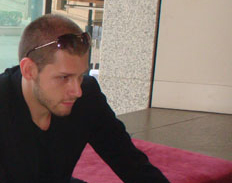Complexity – Speed – Perfection
 This article is going to take a look into what is going on in the background when we are practicing, of course with a special focus on playing fast, which could possibly be considered the primary focus of any ‘shred’ guitarist, but is also important to all guitarists in general.
This article is going to take a look into what is going on in the background when we are practicing, of course with a special focus on playing fast, which could possibly be considered the primary focus of any ‘shred’ guitarist, but is also important to all guitarists in general.
It takes a lot of practice to develop speed, but today we are going to look deeper into the phenomena of developing speed from a skill acquisition point of view. A lot of people tend to have an implicit understanding of practice, but there is a lot to be gained by laying it all out in front of you, something that I’m hoping to do partly here for you in this article.
One of the keys to better practice is being able to break things down into chunks that are small enough for you to be able to focus on and execute with a high degree of perfection. I call this process ‘Isolation’.
How do we do this? Simply put, there are three things that influence how much data something will take up, and decreasing one means you will be able to increase the others (we can only do so much at once, as our conscious focus is limited). They are…
- Complexity – How large what you are focusing on is. For example, a three note phrase is less complex than a whole solo, which in turn is less complex than an entire song.
- Speed – How fast you do something.
- Perfection – How accurately you can do something. In the context of guitar playing, perfection is measured by things such as how well you play a phrase in the proper time and notes.
Notice if you try to play an entire song in one go without breaking it down, you can only do it if you try to do it really slow, or really sloppy? Another example is, when you try to play something quicker, often how well you are able to play it deteriorates, and more practice is needed.
For a final example, there is the textbook example of perfect practice, slowing what you are learning down and breaking it down into smaller pieces, which will allow you to play it (or initially, parts of it), perfectly.
The thing with learning however is whatever you do and repeat consistently is what will become habitual. Once something is habitual, our focus is freed up to learn something else.
The problem most players have and the mistake they make is that they try to go too fast too soon, and they sacrifice perfection and become sloppy in the process. This lack of perfection means they can’t attain the consistency required to build a strong enough habit so they can continue to improve.
So when you practice, be sure to always lower the speed and complexity first; to a level that will allow you to reach near complete perfection, and work on practicing that until it becomes habitual. As time passes, you can gradually bring up the speed and complexity. With this approach you’ll find you will achieve ongoing and consistent practice.
Be sure to implement this concept into the way that you practice and hopefully you’ll be improving quicker in no time.
Live for Shred!
– Roberto Moretti
Roberto Moretti is a guitarist and the author of ‘Practice Made Perfect: How Anyone Can Master Anything Quicker, Easier and Better Than Ever’.











